- Home
- Donald Hamilton
Ambush at Blanco Canyon Page 2
Ambush at Blanco Canyon Read online
Page 2
“Well, as a matter of fact, he did. And as Clem Maragon’s legal heir, I’m the proud possessor of unimpressive stack of legal documents entitling me to all kinds or rights and perquisites, which various people have offered to buy. Buck Hannesey is even willing to marry them—although I flatter myself his interest goes a little beyond the papers. It’s a very intriguing situation, Mr. McKay.”
“Has Major Terrill made you an offer?”
“Yes, of course.” The girl glanced at the closed bedroom door. “It’s created quite a strain on my friendship with Pat. She can’t understand why I don’t sell to the major and settle the whole business. She doesn’t seem to realize that the Hanneseys have no intention of remaining penned up in the area south of Big Muddy, no matter who gets the legal title. Rufus Hannesey waited a long time for Gramps to die, he was smart enough not to tackle Gramps, who was an old wolf when he wanted to be, and who was known and respected throughout the state. The old robber’s willing to wait a little longer, to see if he can’t get what he wants legally. As long as he doesn’t know which way I’m going to jump, as long as Buck reports that he’s making headway and Big Muddy’s practically in the family, he’ll hold off’. The minute I sell to Ladder, he’ll strike. No, Mr. McKay, I’m not going to sell to Pat’s father even if she is my best friend; if I sell to anybody. I’ll sell to the Hanneseys.”
“That seems like a strange conclusion,” McKay said.
The girl shook her head. “No. Because if the Hanneseys should get legal title to Big Muddy, Major Terrill’s law-abiding enough that he won’t try to drive them out. So we’ll have a few more years of peace until Hannesey is ready for his next move, and who knows what may happen in the meantime? He may die or this country may become so thickly settled that no big ranches will survive.” Julie Maragon leaned forward in her chair. “Don’t you see, Mr. McKay? It’s my decision. It would be very easy to sell it to my friends and watch them have to fight a bloody range war to hold it. Maybe—maybe, if I get tired enough, that’s what I’ll do, after all. But I keep hoping there’s another solution. Besides——”
“What?” he asked as she hesitated.
“Besides,” she said with a quick smile, “it’s such a pretty place, I just kind of hate to sell it and lose all hope of ever going back there to live. I ride out there every so often—” Her voice trailed off. Presently she looked up abruptly. “You’re a comfortable person to talk to, Mr. McKay. I’ve said too much. I hope you’ll keep it in confidence.” She caught the direction of his glance, “Oh, not from Pat, I don’t ask that! She thinks the Terrills can take care of themselves.” Julie Maragon smiled and looked at McKay directly, “People who think that always have to be taken care of by other people, don’t they?”
He frowned. “What do you mean?”
“Why didn’t you marry her back East? You have my respect, Mr. McKay; a lesser man would have taken advantage of her loneliness and recklessness, and married her at once.”
He said, rather stiffly, “You give me too much credit. It’s merely that I consider marriage a pretty serious business, and I want to do it properly, since I only expect to do it once.”
“Perhaps,” she said. “Nevertheless——”
The sound of hoofbeats in the street outside interrupted her. They rose, and the bedroom door dew open as Patricia came running out to join them.
“It’s Steve!” she cried. “I’ll go see how he made out!”
She gathered up her skirts and ran out or the house. McKay and Julie Maragon followed more slowly, reaching the gate in time to hear the tall rider in the street say, “. . . when they saw they was out-numbered. There was no light in them. Well, I’ll be bringing Mike and Shorty home as soon as the boys get them sobered up enough to ride.”
He hesitated, and his glance touched McKay and moved back to the girl standing below him. “You might as well start out as soon as you’re ready, ma’am, we’ll be only a couple of miles behind you, and I reckon you’d as soon travel alone.”
“All right, Steve,” Patricia said. “And thanks! I was worried for a while.”
“Nothing to worry about, ma’am.”
He reined his horse around and set off at a sudden gallop, making, McKay decided, more of a spectacle of his departure than was entirely necessary. McKay glanced at the girl beside him and found her watching him. He grinned, but her face was serious.
“You’ve picked yourself a hard furrow to plow, Mr. McKay,” she said quietly. “I wish you luck. And—there are very few gentlemen on the range. Watch your step.”
Patricia came back to them; and McKay held the gate for her to enter. She said. “Well, I’m glad that’s finished! I really was worried, but I should have known Steve would handle it all right, I don’t know what dad would do without him . . . And don’t you make any remarks, Julie Maragon!” she added with a laugh; explaining to McKay. “Julie thinks Steve takes himself too seriously. Well, he is a good man, and he knows it.”
“He’s a handsome one, to be sure, and he knows that too.” Julie said dryly. “Well, if you’ve got your things packed, Pat, maybe you’d better get started . . . Wait a minute! Has this traveler of yours had anything to eat all day?”
Patricia looked at McKay, startled and saw the answer on his face, “Heavens!” she cried “Why didn’t you say something, darling? Well, we’ll fix you something quickly while you’re changing your clothes, it won’t take a minute . . . What’s the matter?”
McKay asked deliberately, “Precisely what’s wrong with the clothes I’m wearing, Patricia.”
She said impatiently, “Well, you’re certainly not going to the ranch in that ridiculous hat.”
There was a moment of silence, while McKay removed the offending headgear, examined it, brushed it with his sleeve and replaced n calmly on his head, “My dear,” he said, “if you think I am going to appear before your father in a sombrero a yard wide, boots with three-inch heels, and a revolver with a barrel a foot long, you are sadly mistaken.”
There was a quick, choked sound of laughter from where the smaller girl was standing. Patricia blushed. “But I just——”
McKay said, “Just what?”
She waited, “But I just don’t want them to laugh at you, darling!”
He grinned, “You’d belter resign yourself right now to the fact that no matter what kind of clothes I have on when I get to your ranch. I’m going to look just like a tenderfoot. So let’s get out there and give the boys their laugh. If I can stand it, surely you can.”
Half an hour later the town was behind them and they were driving westward toward the sun that was already beginning to sink through the intensely blue sky to the incredibly distant horizon ahead.
“I keep thinking,” McKay said presently, “That it’s kind of like being at sea.”
“It’s a big country, darling,” Patricia said. Her momentary anger had faded. She reached out to put her hand in his arm. “I do hope you’re going to like it here.”
He glanced at her “Well enough to slay, you mean?”
She hesitated and after a moment, nodded quickly. “Yes. Of course, I’ll go back East with you if that’s what you decide. I’d have stayed there if you’d let me last fall. But this is my country and I love it, Jim.” She pressed his arm eagerly. “You wrote that there was a possibility. Is that really true?”
He said, “Before I commit myself, let me talk to your father and look around a bit. Which reminds me; dad had a pair of cased dueling pistols—he was kind of an old-fashioned gentleman, he believed in sailing ships and in affairs of honor; as a matter of fact, he fought a number of them. Anyway, the pistols are obsolete, of course, and they’re rather pretty pieces, and I thought your father might like to have them.”
“I’m sure he would. It was nice of you to think of it.”
“And there’s a brooch that my mother used to wear that I brought along for you, kind of a family trinket. It’s in the top of my valise, if you care to look for it. I don’t trust th
ese Western broncos of yours enough to turn my back on them.”
Patricia rose to kneel on the seat, reaching for the luggage in the bed of the wagon behind them. McKay checked the pomes slightly, so the jolting would not throw her off balance. He glanced around casually, his eyes sweeping the horizon in a practiced manner. This country might have its drawbacks, but it gave you the same feeling as the ocean. Then something caught his glance along the road ahead.
He said easily. “I don’t suppose there’s much danger from Indians any more.”
Patricia laughed. “Indians! Darling, don’t act any more like a greenhorn than you have to. Whatever made you say that?”
“That little gully ahead.” he said “There’s somebody in it. Several somebodies, in fact. They seem to be waiting for us.”
She straightened up quickly to glance at him; then she looked where he pointed. He had pulled the wagon to a halt. As she looked, a group of horsemen rode out of the high brush that bordered the road where it passed through the wash ahead. There were six or seven of them. They swung into the road and started toward the motionless buckboard. They were obviously not Indians.
McKay studied them for a moment. “Hannesey’s men, I suppose.”
“Yes, I think so. That looks like Buck Hannesey on the bay. How did you——”
“It seemed logical. They were routed by superior numbers in town, so they decided to lie in wait along the road. I don’t suppose we can outrun them.”
“I wouldn’t run from that bunch of saddle tramps, anyway!” Patricia was on her knees again, reaching behind the seat; she settled back with a short-barreled carbine in her lap. “Go on. If they start anything, I’ll take care of them!” She glanced at him impatiently. “Drive ahead, Jim!”
He looked at the approaching riders thoughtfully, weighing the various elements of the situation. Of them all, one was, of course, supreme: the safely of the girl beside him. Second came the consideration that, tenderfoot or no, he could hardly hide behind a woman’s skirts—or rifle.
He said, “They aren’t likely to do you any harm, are they?”
She laughed scornfully. “Even the Hanneseys would hardly touch a woman, the whole county would help string them up. Out——”
“That’s what I wanted to know,” he said. Before she realized what he was about, he had taken the carbine front her bonds. “In that case,” he said, “we’ll dispense with the firearms, my dear.” He tossed the weapon into the back of the wagon. A moment later the riders were all around them.
The man on the bay horse rode up close on McKay’s side. He was young, and although it was difficult to judge his height in the saddle, he gave an impression of rawboned tallness, he had dark red hair that needed cutting, it grew in long sideburns down his jaw and he had a bushy red mustache as well. His eyes were small, deep-set, and mean in his bony face.
“Pleasant day, Miss Terrill,” he said. “The boys tell me there was a little trouble in town. If I’d been there, it might have turned out different. Steve Leech don’t scare me the way he does some people.” He looked down at McKay as if discovering his presence for the first time. “This the fellow you’re going to marry. Miss Terrill? Mighty handsome little man, all dressed up in a fancy suit And I sure do admire that hat he’s wearing.”
Suddenly he spurred his horse forward, snatched the bowler hat from McKay’s head and, with a snapping motion of the wrist, sent it flying; with a continuation of the same movement, he whipped out the big revolving pistol he carried at his hip in a carved holster, and fired. In an instant all the men were yelling wildly and tiring at the hat as it soared high rising on the wind. At last it lost its forward motion and settled lightly to the ground and the shooting stopped.
“Mighty pretty little man.” the rider on the bay horse said. “Too dang pretty for a Texas girl . . . Get him, boys!”
There was a whispering sound in the air; a rope settled about McKay’s shoulders, pinning his arms to his sides, and snatched him from the seat of the buckboard. He heard Patricia cry out as she fell; then the impact drove the breath out of him. He was dragged a way along the ground. The motion stopped.
“Get up.” said the voice of the red-haired man.
He got clumsily to his feet. Another loop came from nowhere; the two ropes grew tight, holding him motionless in the middle of the road. The red-haired young man had dismounted. There was a wicked look of pleasure on his face as he walked forward and hit McKay hard in the pit of his stomach with the left hand; then, as he doubled up, clubbed him across the head with the pistol still held in the right . . .
McKay came back to full consciousness with Patricia kneeling beside him, he looked around and saw that they were alone on this stretch of road, and he thought, with relief, Well . . . that’s over. When he tried to get up, agony pounded through his head, but he made it nevertheless, and walked away from the girl. When he returned, he had the hard hat in his hands He dusted it off and showed it to her.
“I don’t think much of their marksmanship,” he said. “They didn’t hit it once. Come on, let’s get out of here.”
Julie Maragon watched the two figures in the buckboard until the vehicle turned out of sight on Main Street, then she straightened abruptly and closed the gate and made sure the latch was caught. She smiled and walked quickly into the house and busied herself tidying the bedroom, reflecting that Pat Terrill needed only live minutes in a room to make it look like the wake of a tornado. She found herself wondering how that would set with Mr. McKay, who looked like an orderly sort of man . . .
After dinner, she was reading in her favorite chair by the window—she was developing a fine set of spinsterish habits, it occurred to her—when Buck Hannesey’s footsteps crossed the porch and his knock shook the door. There was never any mistaking those boots or that fist, and she sat quite still in the chair, gripping the book, until the quick panic the man always aroused in her was put under control. Then she laid the book carefully aside, after marking her plate. Hannesey rapped on the door again.
“Just a minute, Mr. Hannesey,” she called, and walked deliberately into the bedroom and stood before the mirror for a minute or two, smoothing her hair, which didn’t need it. The panic was gone now and she noted that her eyes were brighter than they had been. Why you little coquet, she scolded herself, but knew that she was not being fair to herself. The cold excitement she felt was that of the huntress, not the girl, she had a dangerous beast at bay. She walked quickly back into the other room and pulled the door open, stepping back to admit the man who stood outside.
“Come in, Mr. Hannesey,” she said. “I didn’t know you were in town. This is a pleasant surprise.”
He came in, ducking his head to avoid the low doorjamb. “Just riding through, ma’am,” he said, holding his hat in both hands awkwardly, but there was never any awkwardness about those small, deep-set eyes. “Just dropped by to see if you was all right here,” he said.
“Were, Mr. Hannesey.” she said, smiling. “ ‘To see if you were all right,’ is the correct form.”
He chuckled, “You tell me, ma’am. I never had much schooling.”
This was part of the game, his mock humbleness before her superior knowledge, but it meant nothing. She asked, “Why on earth wouldn’t I be all right here?”
“Why, ma’am, a pretty woman living alone is kind of a temptation in the land of men.”
She looked up into the gaunt, red-mustached young face and reminded herself never to forget that this man was not stupid. He could threaten subtly while apparently turning a compliment; he never let her forget that she was completely at his mercy, being weak and alone, if he should ever decide to pay the price of taking her by force; she had even in a large measure forfeited the protection of the community by keeping him dangling so long.
She smiled. “There’s flattery in that speech, I’m sure. You’ve got a long ride if you’re heading back to the ranch tonight; perhaps you’d like a cup of coffee.”
He shook his head “No,
ma’am, thank you just the same. Just stopped in for a moment, like I said.” He looked around the room. “That high-and-mighty friend of yours from Ladder was here, wasn’t she?”
“Pat Terrill stayed overnight, yes. Why do you ask?”
“The Terrills ain’t friends of ours. I’ve mentioned it before. You’re going to have to make the choice sometime, ma’am. When is it to be?”
“And I’ve told you, Mr. Hannesey, that I’ll select my own friends.”
He shook his head, “It won’t do. In this country you’re on one side or the other; you can’t have it both ways. There’s talk you’ve been playing me for a fool, ma’am. I wouldn’t like to think that was true.” He did not give her time to respond, but went on, “I just stopped to pass the time of day with your friend and her intended, outside of town. He’s kind of a dude, ain’t he? We had a little fun with the dude, but not much. He didn’t put up much of a fight. Is that the kind of man you want, ma’am, with a starched collar and a fancy hat and too little nerve to hold a gun? Wouldn’t even let the girl use it. Maybe you ought to go East and fetch a tame one like that for yourself, since you don’t seem to care for the kind of men that grow in this country.”
She could smell him now, the rank odors of tobacco and sweat and horses and whisky. She said. “You’re drunk, Mr. Hannesey. I must ask you to leave.”
He said, “You’re scared of me, ain’t you?” He studied her shrewdly, “You’re mad too. What makes you mad, ma’am? Don’t you like my roughing up your friend’s dude? You thinking of getting a pretty one like that for yourself, ma’am? Well, it wouldn’t be smart, because he wouldn’t last long. Not any man who looks at you twice. Good night, ma’am.” And he was gone.
It was dark outside now. She heard him swing into the saddle and ride away. She wanted to throw herself down on the bed fully dressed and bury her face in the pillow, but she forced herself first to take care of the little nighttime chores that were left to be done around the house, and get into her night clothes. Then the bed received her gratefully, but it was a long time before she fell asleep, and her slumbers were not sound.

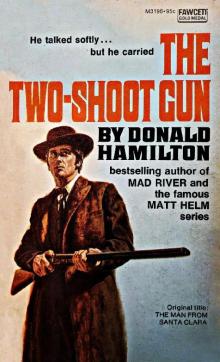 The Two-Shoot Gun
The Two-Shoot Gun Mad River
Mad River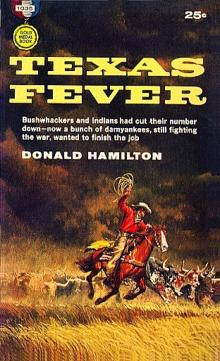 Texas Fever
Texas Fever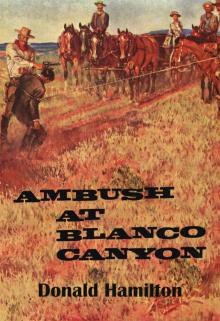 Ambush at Blanco Canyon
Ambush at Blanco Canyon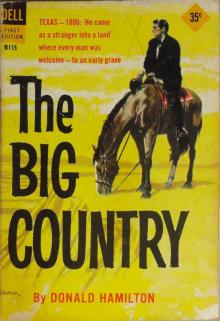 The Big Country
The Big Country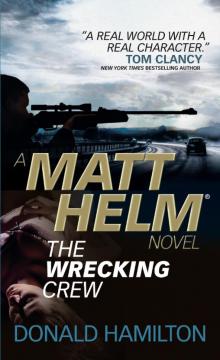 The Wrecking Crew
The Wrecking Crew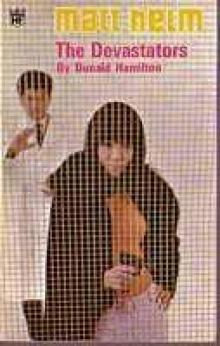 The Devastators mh-9
The Devastators mh-9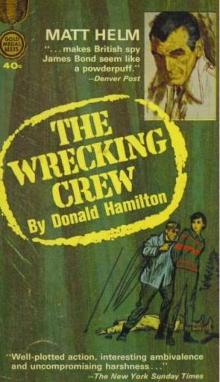 The Wrecking Crew mh-2
The Wrecking Crew mh-2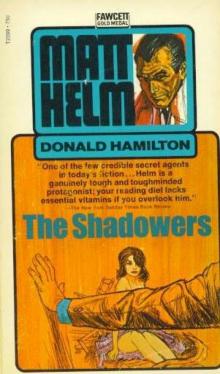 The Shadowers mh-7
The Shadowers mh-7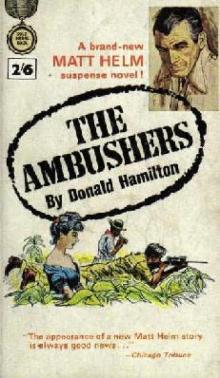 The Ambushers mh-6
The Ambushers mh-6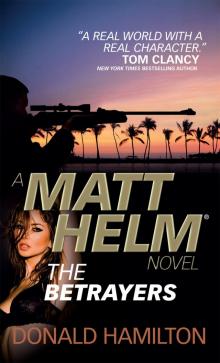 The Betrayers
The Betrayers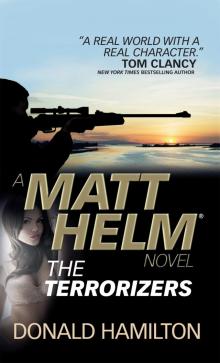 The Terrorizers
The Terrorizers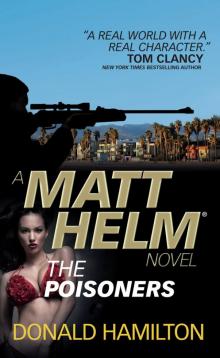 The Poisoners
The Poisoners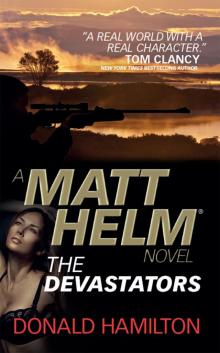 The Devastators
The Devastators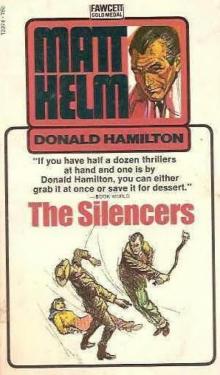 The Silencers mh-5
The Silencers mh-5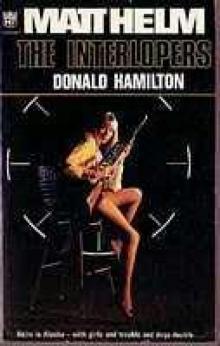 The Interlopers mh-12
The Interlopers mh-12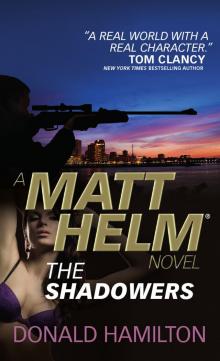 The Shadowers
The Shadowers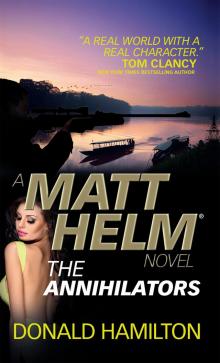 The Annihilators
The Annihilators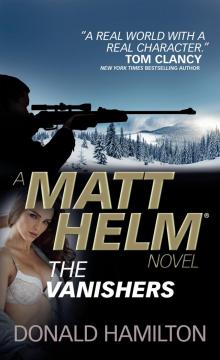 The Vanishers
The Vanishers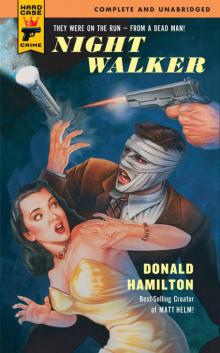 Night Walker
Night Walker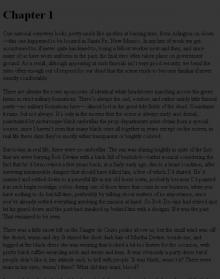 The Revengers
The Revengers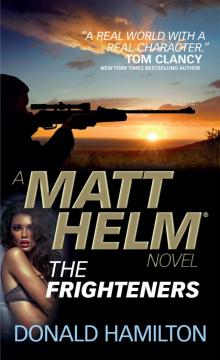 The Frighteners
The Frighteners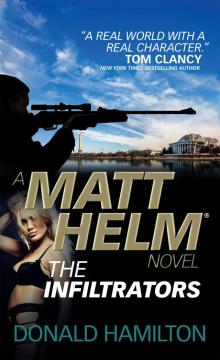 The Infiltrators
The Infiltrators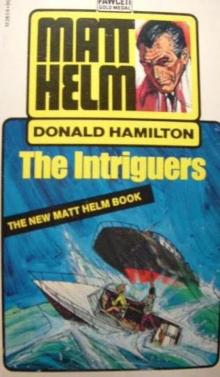 The Intriguers mh-14
The Intriguers mh-14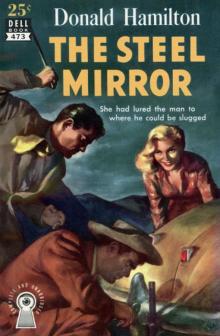 The Steel Mirror
The Steel Mirror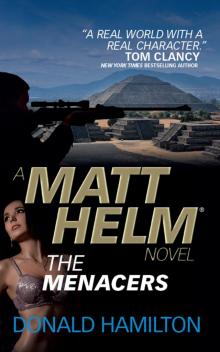 The Menacers
The Menacers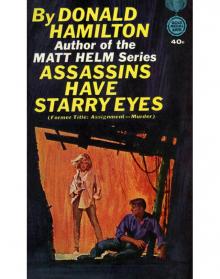 Assassins Have Starry Eyes
Assassins Have Starry Eyes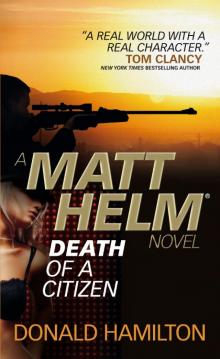 Death of a Citizen
Death of a Citizen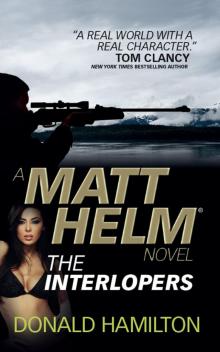 Matt Helm--The Interlopers
Matt Helm--The Interlopers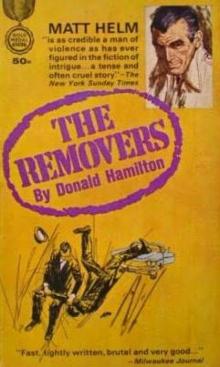 The Removers mh-3
The Removers mh-3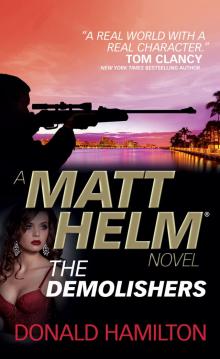 The Demolishers
The Demolishers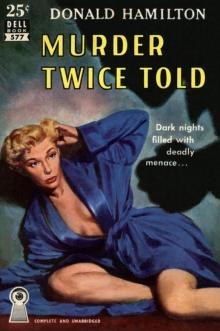 Murder Twice Told
Murder Twice Told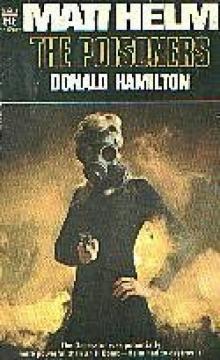 The Poisoners mh-13
The Poisoners mh-13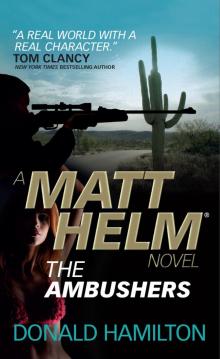 The Ambushers
The Ambushers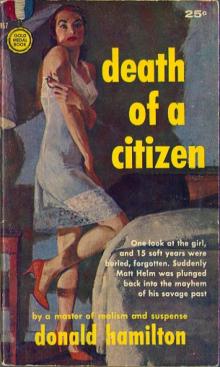 Death of a Citizen mh-1
Death of a Citizen mh-1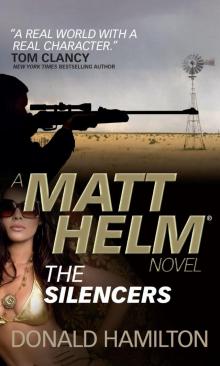 The Silencers
The Silencers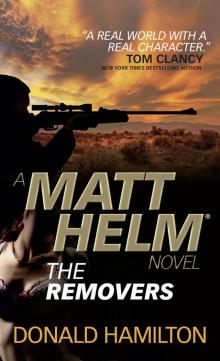 The Removers
The Removers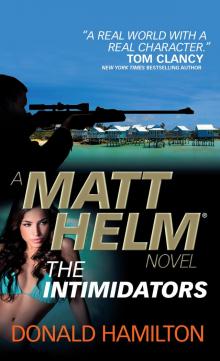 The Intimidators
The Intimidators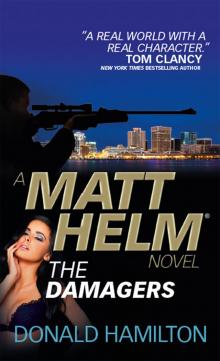 The Damagers
The Damagers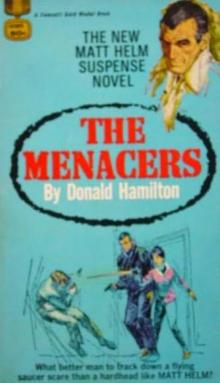 The Menacers mh-11
The Menacers mh-11 The Retaliators
The Retaliators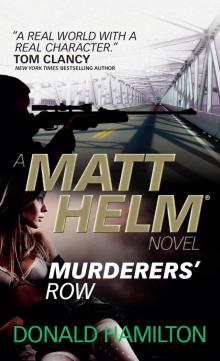 Murderers' Row
Murderers' Row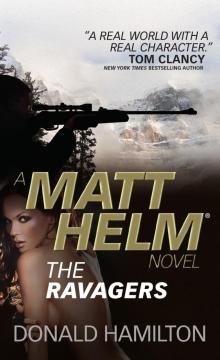 The Ravagers
The Ravagers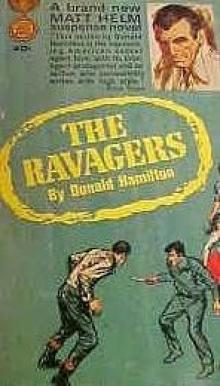 The Ravagers mh-8
The Ravagers mh-8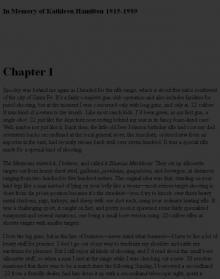 The Threateners
The Threateners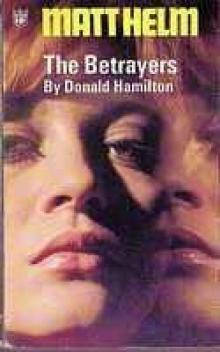 The Betrayers mh-10
The Betrayers mh-10